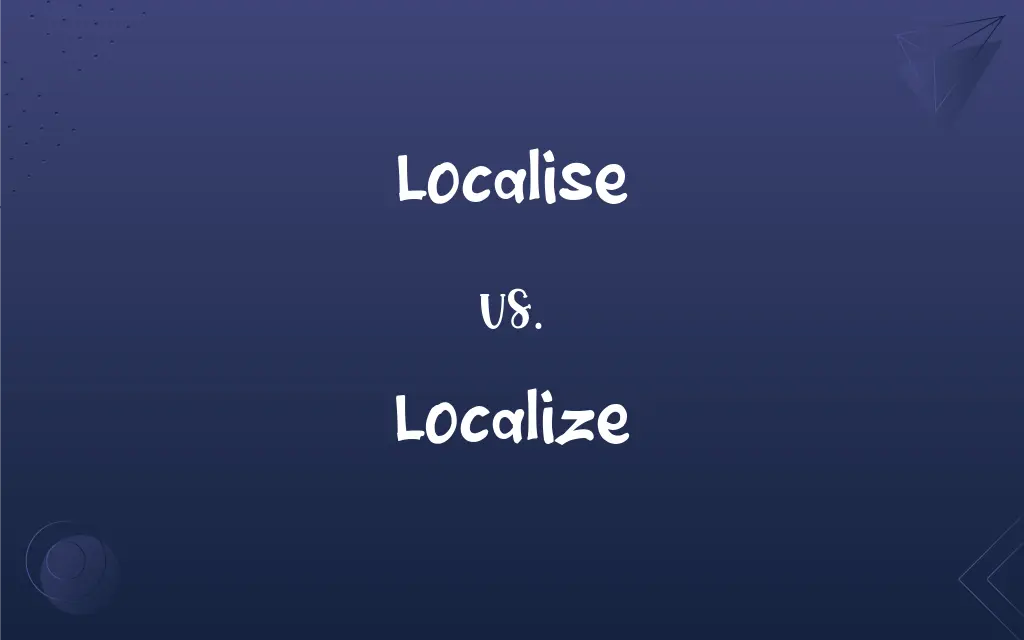Localise vs. Localize: What's the Difference?
Edited by Aimie Carlson || By Harlon Moss || Updated on November 8, 2023
"Localise" and "localize" mean the same: to adapt something to the local circumstances. "Localise" is British English, while "localize" is American English.

Key Differences
"Localise" and "localize" are variants of the same verb, reflecting British and American English spelling conventions, respectively. Both words describe the process of making something specific to a locale or region. "Localise" is often seen in UK publications, while "localize" is preferred in US texts. These spellings are emblematic of the broader differences in the English language across different regions, illustrating the rich tapestry of its global variations.
Each version of the word carries the same meaning: to adapt content, a product, or a service to suit a particular culture, market, or country. The adaptation process might involve translating text, altering graphics, or modifying content to meet local laws and cultural sensitivities. "Localise" and "localize" both guide this tailored approach, ensuring relevance and accessibility to the target audience, whether they be in Birmingham, UK, or Birmingham, Alabama.
With globalization, the importance of "localise" or "localize" has grown. Companies and content creators aim to reach a broad audience while maintaining a local feel. The use of "localise" in a UK-based company's documentation might suggest a global perspective with a homegrown touch, while "localize" in a US firm's materials conveys a similar international outlook.
In the field of translation and software development, "localise" and "localize" are technical terms. They describe the process of adapting products, especially digital content, to different languages, cultures, and legal requirements. "Localise" might be used in a project specification in the UK, while "localize" would appear in a US-based developer's guidelines.
Despite their different spellings, "localise" and "localize" perform identical functions in language. They remind us that English is not a static entity but a language that adapts and changes depending on who is using it and where. Whether one opts for "localise" or "localize," the intention is clear: to make something resonate with a local audience, wherever that may be.
ADVERTISEMENT
Comparison Chart
Spelling Tradition
British English
American English
Usage in Software Development
Often used in documentation and interface design in the UK
Commonly used in the US tech industry
Global Marketing
Adapt marketing materials for the UK market
Tailor marketing to American consumers
Translation Services
UK translation services offer to "localise" content
US firms advertise their ability to "localize"
Online Search Preferences
More common in searches from the UK and Commonwealth countries
Predominant in searches from the United States
ADVERTISEMENT
Localise and Localize Definitions
Localise
To localise means to adapt something to local conditions.
The company had to localise their app for the Indian market.
Localize
To localize is to alter a product to comply with local laws.
Car models are localized to meet different emissions standards.
Localise
To localise is to adjust a service or product for use in a specific location.
The mobile game was localised with maps of famous cities.
Localize
Localize can mean to convert prices into the local currency.
The online store localized prices into euros for its European customers.
Localise
Localise can also mean to translate text into the local language.
The book was localised into Spanish to increase its reach in Latin America.
Localize
To localize can also mean to restrict something to a particular locality.
The outbreak of the disease was localized to a single community.
Localise
To localise is to make content or a product suitable for a specific region.
To appeal to French customers, the website was localised with cultural references.
Localize
To localize is to adjust something to fit the tastes and consumption habits of a specific region.
The software was localized for the Brazilian market, including local idioms.
Localise
Localise may refer to the concentration of something within a particular area.
The study localised the source of the pollution to a nearby factory.
Localize
Localize involves customizing content to align with local cultural norms.
The ad campaign was localized to avoid cultural misunderstandings.
Localize
To make local
Decentralize and localize political authority.
Localize
To confine or restrict to a particular locality
Localized the infection.
FAQs
Does localise/localize only refer to language translation?
No, it also involves cultural adaptation and compliance with local regulations.
What is localise/localize?
Both mean adapting something to local conditions; "localise" is British English and "localize" is American English.
Why is it important to localise/localize products?
It's important to ensure products are culturally and linguistically appropriate for the target market.
How does localisation/localization impact user experience?
It enhances user experience by making content more relevant and accessible.
How do "localise" and "localize" affect SEO?
Using the preferred regional spelling can improve search engine optimization in that region.
Can "localise" and "localize" be used interchangeably?
Yes, they can be used interchangeably based on the regional version of English being used.
What professionals are involved in the localisation/localization process?
Translators, cultural consultants, legal experts, and localization engineers.
Can localise/localize be used in a medical context?
Yes, in medicine, to localise can mean to identify the location of a condition or disease within the body.
What tools are used for localising/localizing digital content?
Localization software, translation management systems, and cultural assessment tools.
How do you decide whether to use "localise" or "localize" in writing?
It depends on the intended audience's regional English variant.
Can a product be too localized/localised?
Over-localization can occur, making a product less appealing to other markets.
Is the process of localising/localizing complicated?
It can be complex, involving language, culture, legal, and technical considerations.
What is a common challenge in localising/localizing content?
Balancing the original message with local cultural and linguistic nuances.
Are there instances where "localise" and "localize" cannot be used interchangeably?
In context to regional English preferences, they are not interchangeable.
Does localisation/localization apply to services as well as products?
Yes, both services and products can and often need to be localised/localized.
Is localise/localize a recent concept?
No, but it has gained more importance with the rise of global trade and the internet.
Do localise/localize include legal adaptations?
Yes, adapting to local laws and regulations is a key part of the process.
Are there cultural sensitivities to consider in localisation/localization?
Absolutely, cultural nuances are critical to successful localization.
Does localisation/localization affect brand identity?
It can, but careful localization considers maintaining brand consistency.
How is localisation/localization viewed in academic research?
It's a significant field of study in translation, marketing, and international business.
About Author
Written by
Harlon MossHarlon is a seasoned quality moderator and accomplished content writer for Difference Wiki. An alumnus of the prestigious University of California, he earned his degree in Computer Science. Leveraging his academic background, Harlon brings a meticulous and informed perspective to his work, ensuring content accuracy and excellence.
Edited by
Aimie CarlsonAimie Carlson, holding a master's degree in English literature, is a fervent English language enthusiast. She lends her writing talents to Difference Wiki, a prominent website that specializes in comparisons, offering readers insightful analyses that both captivate and inform.
































































